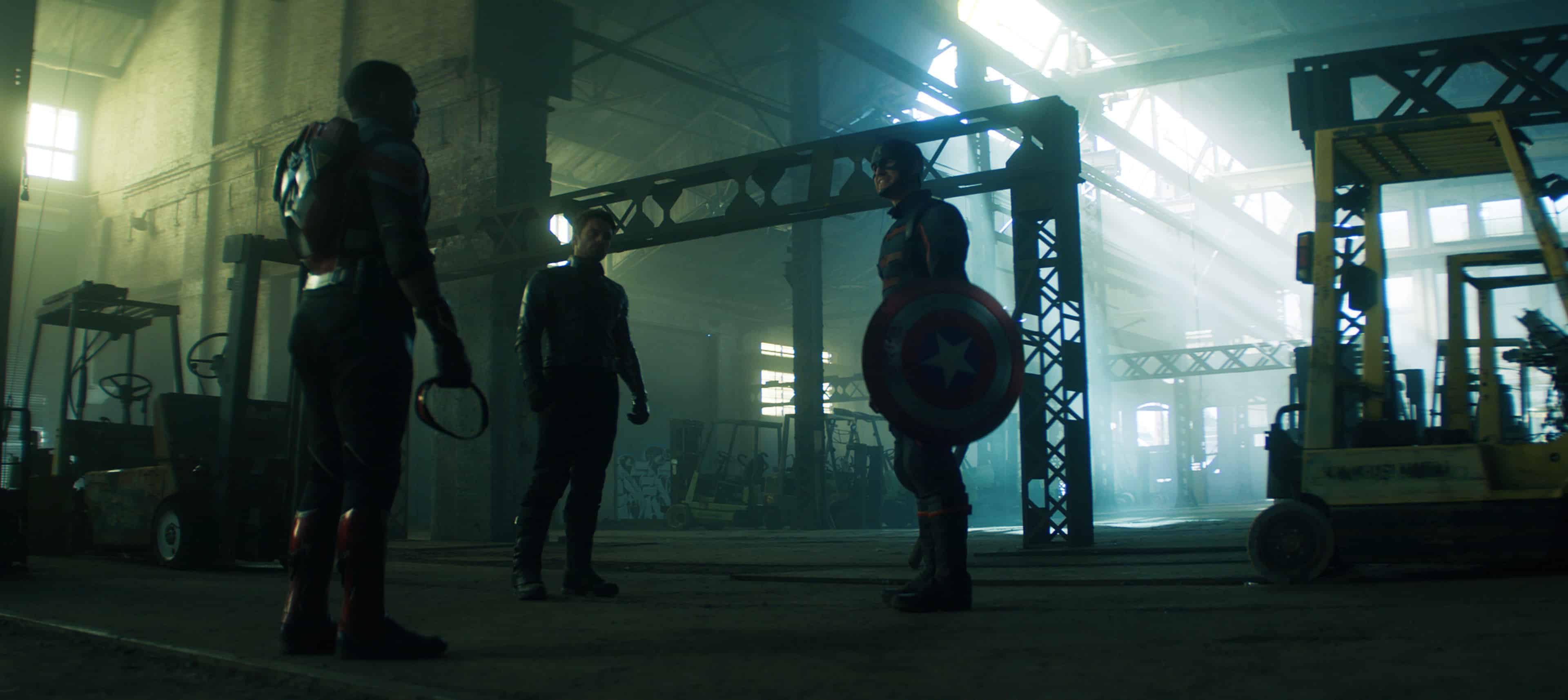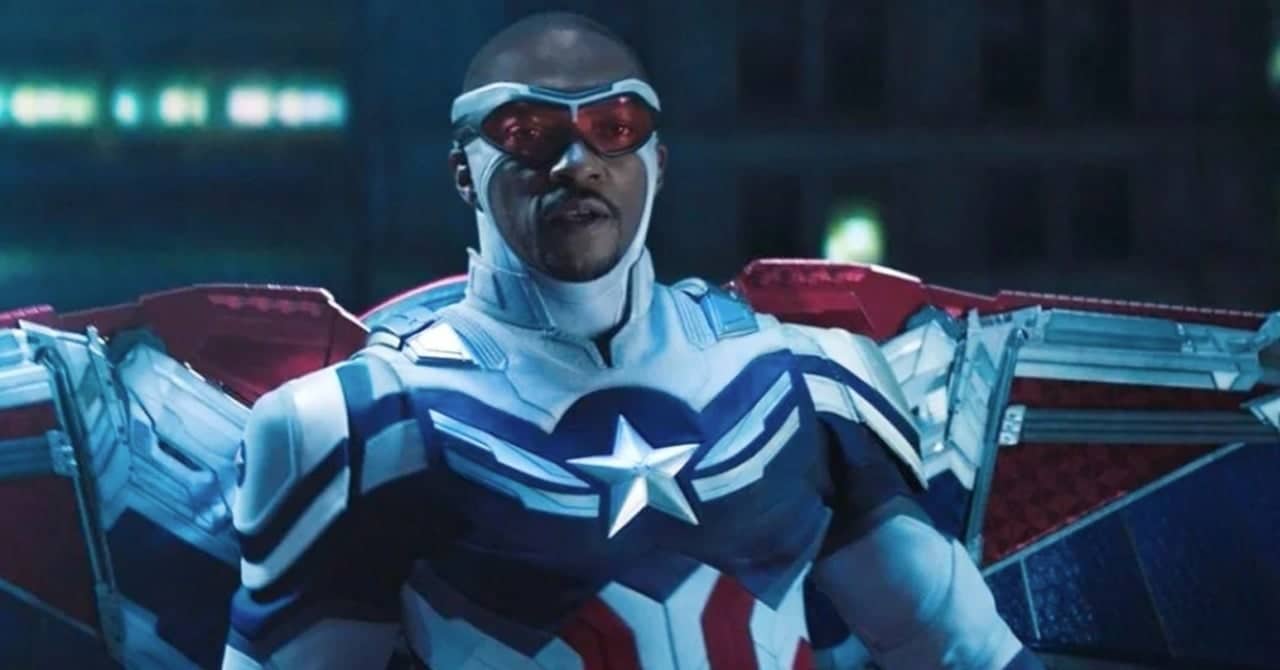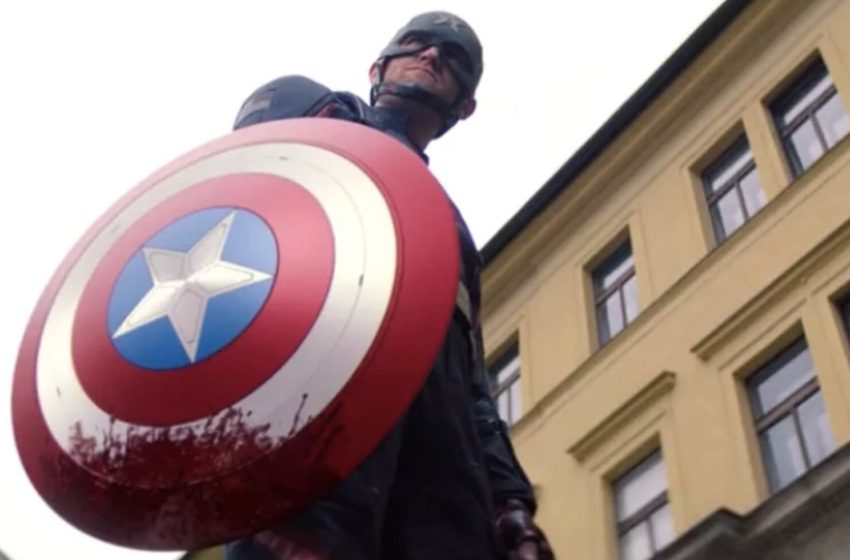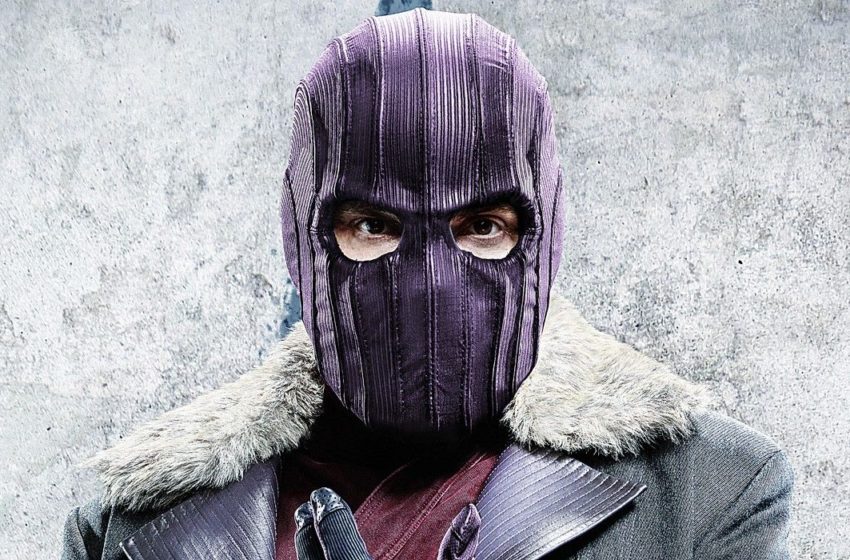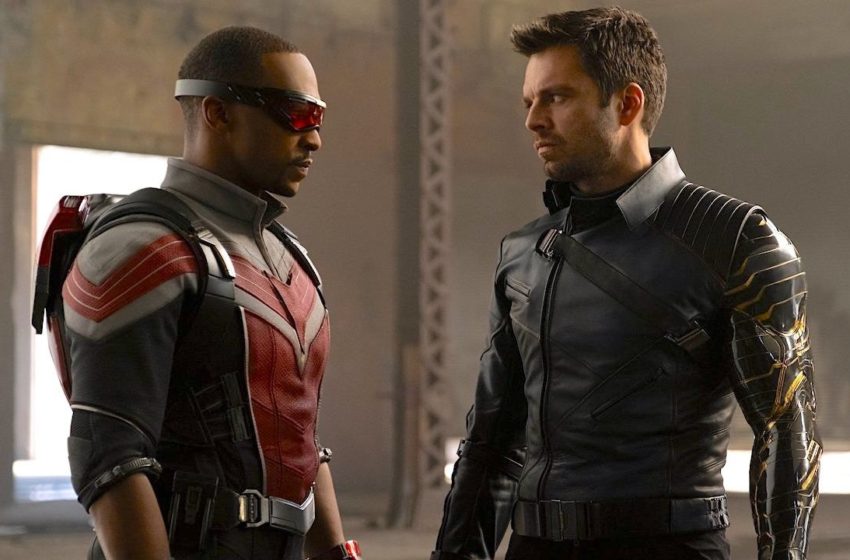A white man faces consequences, a Black man learns about Black History, and a cyborg begins his White Boy Summer in “Truth” from Disney+’s The Falcon and the Winter Soldier.
Kenneth Laster: Another week, another Falcon and Winter Soldier! I am finding myself torn by being entertained and engaged by this episode and also just asking out loud “what is the point?” This episode felt like the strongest to me from a storytelling standpoint but it is wild to me how close to the end the show decided to pick up. I’m very happy to have you back Corey to unpack all of this because–this show!
Corey Smith: Hey, I’m glad to be back! “This show!” is right – I’ve got Thoughts and Opinions, as per usual, and I’m excited to make them everyone’s problem. I definitely agree that this episode was the strongest so far (though, wow, this was a hell of a week for it to come out), but I can’t help but feel it’s too little, and too late. Especially considering the way it’s been going so far, odds are there won’t be much consistency between this week’s episode and the finale. But, I’m getting ahead of myself, so let’s get into it!
Walker, Contessa’s Ranger

KL: First up, this episode very much is it’s 6-Part-Movie element where we begin by wrapping up the last couple of eps worth of story with Zemo, the Wakandans, but most notably up top, John Walker. The Flag Lads™ (Sam and Bucky) confront Walker after he publicly executes a Flag Smasher and the fight that ensues is pretty brutal. What did you think of this confrontation Corey?
CS: I think I speak for everyone when I say that Walker’s arm snapping harder than Thanos with the Gauntlet is gonna stick with me for the rest of the week, that’s for sure. It was a hell of a fight, and it’s good to see how Bucky and Sam work together as a unit, but at the same time, I’m not sure it felt entirely earned at this point? It really seemed like the Flag Lads™ were more concerned with taking the shield, and that Walker’s killing of Nico was simply a convenient excuse. I can’t say I’m surprised by that, considering the body count each of them has racked up in this series alone, which is… frustrating, to put it lightly. For as much as Sam was telling Karli that the world doesn’t get better if you kill people in the last episode, the series definitely started with him blowing up a helicopter full of dudes. That sort of inconsistent, wishy-washy, protagonist-centered morality has been an issue that’s plagued the MCU from the start, and I feel that this show in particular has a lack of consistency from moment to moment that never fails to take me out of it.
That said (and I realize I was saying the opposite back in Episode 2), Walker is unambiguously an asshole, and killing the Flag Smasher, who had surrendered and was relatively defenseless at that point, doesn’t exactly endear him to me. At this point, he’s convinced himself that he’s in the right, that he has the mandate to do what he thinks is necessary, and anyone who doesn’t get it is in the way. It’s an escalation of his previous mindset, for sure – like Lemar said, power makes a person more of themselves. It seems like that turned him from a baseline, run of the mill MCU jerk into a world-class douchebag. How do you feel about his evolution throughout the series?
KL: I do agree with you on the very much protagonist centered morality leading to really wishy washy lines in the sand. I really was not thrilled with Sam trying to reason with Walker by saying “you made a mistake” or “they’ll take your record into account” especially this week of cops avoiding accountability for murder. It put a bad taste in my mouth immediately. But the fight was really engaging to watch, especially with Walker really not pulling punches with that murder frisbee we call a sheild. Really escalated the stakes.
I do think when it comes to this series getting to the core of who John Walker is, I think that the hearing scene really did it for me. I know most of comics fandom got distracted by surprise Julia Louise Dryfus (I personally screamed), but Walker laying the blame for who he is on the US military industrial complex putting him on trial is a direction I’m surprised to see. In the previous episode we get the admission of his medals of honor being for war crimes and we get a satisfying follow up here in that scene.
John Walker is by no means a passive victim in who he’s become but the American military holds a lot of responsibility in molding the violent man he’s become. It’s a condemnation that I’d be surprised the show gets away with if I didn’t keep having reminders that superheroes and by extension the MCU’s relationship with the military would still stand. Any more thoughts on Walker facing consequences or his later scenes?
CS: Not gonna lie, I was loving that entire scene with Contessa Valentina Allegra de Fontaine myself. (On that note, I’d be remiss if I didn’t plug this fantastic dive into the character from our very own, always exceptional Nola Pfau!) Entirely blank business cards? Genius.
As for Walker himself, I’ve gotta admit, I’m curious to see where he’ll end up next week. The franchise has a history of killing off its villains, and with all due respect to Wyatt Russell, I doubt we’ll be seeing him on the big screen whenever Avengers 5 rolls around. That said, Sam’s a character who’s big on forgiveness, at least when it comes to characters who have names and recognizable actors, so I wouldn’t be shocked to see at least an offer of redemption, for however much as he still can be redeemed. Do I think that he can lay the blame for his own decision in the heat of the moment on the military? No. Do I think that he’s only getting punished so that they can save face with the media and the public? Absolutely. America stands for a lot of things, and a good damn many of those things aren’t pretty. For all of his faults, Walker represents the country well in that regard.
Mending Boats and Building Bridges

CS: So, it’s finally happened. After a full decade of knowing each other (give or take the five years where they didn’t exist), our professional sidekicks have almost admitted that they’re friends! Another three seasons, and they might actually get through a conversation without wanting to kill each other. As annoyed as I’ve been with other aspects of the show, the dynamic between our leads has consistently been a high point for me, and I think that this episode was their best showing yet. How about you, Kenneth?
KL: I fully agree. Their relationship here definitely made this episode one of the standouts. I think it would be really easy for me to be dismissive that “all they did was work on that damn boat” but I think that damn boat was nice to come back to after so long away from that very grounded storyline. As evident in the opening blurb, I find it hilarious that Bucky was on his White Boy Summer shit talking to Sarah. Many memes of Bucky in Wakanda filled my soul in that moment. But on top of that that boat gave a lot of really human moments that I enjoyed and led to a really good conversation between Sam and Buck playing frisbee.
Having Bucky realize that he and Steve really had no idea what it meant passing the shield to him and apologize was genuinely good to hear. And Sam giving Bucky advice on making amends was excellent as well. It’s a really great moment and scene likely because of the build up and tension between them over the series. As frustrating as it was for them to not have these moments of connection until now, it might have been more successful because they didn’t. What were you thinking about these two Corey?
CS: Look, all I am saying is that Mr. Barnes needs to get a job, and stay away from Mz. Wilson and Wakanda. The White Wolf can prowl elsewhere.
That aside, I think you’re 100% correct that the delay in actually making that connection led to a better payoff. While it’s ridiculous that it apparently took the influence of Woke Baron Zemo to make Bucky think about what exactly it meant for Steve to just decide that Sam needed to be Captain America, it’s good to see that he’s learning. It was also very nice to see Sam get back to his original characterization, where he was trying to help vets get back into the swing of things, and honestly just shines further light on how terrible Bucky’s therapist was earlier in the series. At his core, Sam is a man who does his best to support the people around him, for better or for worse, and it’s about time he overlooked his Bucky-shaped blindspot in that regard. I’m definitely looking forward to seeing how their partnership evolves in future installments!
Truth, Injustice, and the Captain American Way

KL: In the show’s penultimate episode it returns back to the question of what it means to have a Black Captain America, and with that brings back Isaiah Bradley (and Eli. Hi Eli!). We were pretty critical when the show originally had Isaiah in to explore this theme, and I feel like I’m more mixed on it now. It’s both better and worse for me in this episode, but what were your thoughts Corey?
CS: I’m with you there – there’s an improvement, but still some of the same issues. We discussed last time that the show has a problem with committing to saying anything, and while I feel that’s still definitely the case this time around, it said nothing a little more firmly. This is still a firmly centrist show, and relies on surface level discussion without ruffling any feathers (apart from the ones Walker ripped off of Sam’s gear), but while I’m hesitant to give it any credit, I think it sort of has to be. For as much as Sam can tell Isaiah he’s being bitter, you can’t introduce Isaiah Bradley and then gloss over everything he says, without defeating the entire point of putting him in the series in the first place! He was done dirty, imprisoned and tortured and experimented on for doing the exact same shit that Steve Rogers did in The First Avenger. I don’t think I’m wrong in saying that Steve wouldn’t have ended up in that position if he hadn’t been turned into a popsicle, and I don’t think Bradley is wrong in saying we all know why. I have mixed feelings on how often Black characters are relegated to being legacy characters for white superheroes, as much as I may love some of the specific characters, but when he said that no self-respecting Black man would want to be Captain America? With everything that entails, and everything that comes with it? Maybe I’m bitter too, but I’m not gonna lie, I felt that.
That being said, I feel that Sam’s eventual decision to pick up the shield regardless was entirely in keeping with his character, and presented fairly well. As much as I’d like to say it’s just a case of him throwing an extra O in “Falcon,” he didn’t dismiss Isaiah’s feelings out of hand, and you could actually see him struggle with his idealism in the face of five hundred years of history. Sam’s consistently been shown to be that guy, to think that things can get better. While the MCU pretty much immediately dropped his history of hi-tech pararescue to have him flying around shooting motherfuckers, he’s a character who’s driving goal is to improve the world around him. The balance between optimism and realism, especially in regards to being Black in America, is a fine line for writers to walk, and I think this is the first time in the entire history of the MCU that it’s been handled anywhere close to well. How about you?
KL: I agree with you fully. Maybe I’m bitter as well, but truly how can you not be after all this time. James Baldwin said it himself, “To be a Negro in this country and to be relatively conscious is to be in a state of rage almost, almost all of the time” and it is definitely hard for me as a viewer to be presented with Isaiah presenting his story and point of view and for him to want to pick up the shield. Your point of bringing up Sam’s idealism being core to his character is a lens I didn’t really consider when it came to Sam but I think it is really hard to put a Black character in a setting that draws focus on anti-Black structures as an idealist without coming off as naive or wilfully ignorant. If Isaiah’s story had been presented worse or watered down in some way Sam’s decision would have felt different but to have Isaiah’s pain represented so raw (s/o Carl Lumbly’s performance) Sam picking up the shield felt baffling.
Sam represents a type of representationalist politics that I personally have become disillusioned with a long time ago. Sam’s nephew seeing himself in Sam holding the shield is supposed to be the moment where we get the representation matters feelings going but that works for Spider-Man because Into the Spider-Verse doesn’t tell you that the spider that bit Peter Parker killed a number of Black people and enslaved and oppressed many more on its way to Miles. Sam taking up the mantle represents a very Obama era viewpoint which tracks with when Sam took up the shield in the comics and for me does not hold the same impact as it does today. The same Obama who showed that Black people can be president, is the same Obama who says “Defund the police” is a harmful slogan. Kamala Harris the first woman, Black, and Asian American VP was California’s “Top Cop”. Even more topical with Lori Lightfoot, the Black Woman mayor of Chicago, is complicit in the violence of the police towards Black and brown kids in the state. Representation alone does not undo the harm done in white supremacist stuctures which is at it’s core, America.
But again this is a Disney show and I am sure Anthony Mackie’s contract has “Captain America” written on it so the show must go on.
CS: That it must. That Baldwin quote has been on my mind fairly often lately, for what I’m sure are obvious reasons – and when it’s not rage, it’s only because I’m too numb for anything more than exhaustion. It’s why even though Sam’s idealism is believable to me, it’s not relatable – I’m firmly of the opinion that certain institutions are so fundamentally toxic that trying to change them from the inside instead of tearing them down to build something better is nothing more than an exercise in futility. I’ve known people like Sam, and I’ve watched as they’ve accomplished precisely jack and shit. Isaiah, on the other hand, represents what has repeatedly been proven to be true. I’m glad that the show let him speak to that truth, I’m just terrified that we’re going to tune in next week to see him walk it all back with a tear in his eye when he sees a flying brother holding a shield.

